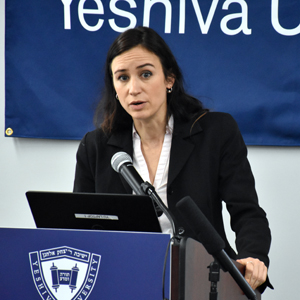Jun 1, 2020 By: yunews
 Dr. Vera Békés
Dr. Vera BékésYour research interests state that you focus on “the empirical study of psychodynamic concepts in various psychopathologies and in the therapy process.” How would you explain that to a non-scientist like myself, especially if I asked, “How does it improve the lives of people?” In my research, I try to understand how psychotherapy can help someone recover from a mental illness or after trauma, or to grow as a person in general—in other words, what are the important active ingredients of therapy. Some people think it is learning about and understanding themselves better in therapy, others believe it is the exercises provided by the therapist, while still others believe it is the healing power of the relational process within therapy. In my work, I am trying to connect theory and practice by investigating actual therapies and establishing what they do that is most helpful in bringing about long-term healing and personal growth. The findings can then inform how we train therapists to help people more effectively. Why focus on PTSD, recovery and resilience? PTSD is a unique mental health condition. Many other diagnoses, like depression, anxiety or personality disorders, usually develop gradually, very often without observable external triggers, and we understand these conditions as disturbances in mental health and functioning. Post-traumatic stress, on the other hand, is a “normal” reaction to an event outside the usual range of human experiences. In this sense, it is the event, not the reaction, that is pathologic. The destructive power of a real traumatic experience cannot be overstated because it alters a person’s life on fundamental levels, and if the experience and its memory are left unattended, avoided and dismissed, they can undermine or narrow the horizon of one’s future. However, there is another important aspect of it: if worked through, it can enrich and transform one’s life, priorities and relationships. Therefore, I am both interested in PTSD and post-traumatic growth, which, interestingly, have been found to often go hand-in-hand. How does your study of Holocaust survivors inform your views of those who have suffered through other social/political traumas? Having worked with Holocaust survivors for a long time, as well as having Holocaust survivors in my own family, I have learnt about their pain first-hand. My interest in Holocaust and genocide research has originated in their experiences, especially in my confusion and fascination about how somebody can survive such horrific experiences and then live a reasonably happy, regular life raising families, working and walking through streets daily while full of unspeakable memories only they know. My grandfather even used to make jokes when telling about his experiences during the Holocaust. Understandably, people make strong efforts to build new lives and forget, or at least move away from the past. The perpetrators’ and bystanders’ interests are certainly similar, minimizing and dismissing what happened. However, we know that the traumatic events, just because time has passed, do not disappear; they will be carried not only by the victims but by their children and grandchildren as well. Does PTSD have a generational impact? Research shows that traumatic experiences are not only transmitted psychologically, through how we talk and behave, but also biologically, through epigenetic mechanisms. For example, children of genocide survivors in Cambodia or Rwanda experience more anxiety and depression than children of adults without this background, and Holocaust survivors’ children are more vulnerable to develop PTSD after trauma. However, initial evidence shows that, similar to what was found in animal experiments, human parental care may be able to counterbalance and protect against trauma’s transgenerational impact. What was the road that brought you from Budapest and Pecs to Montreal and Quebec City and then to New York? Are your origins in Hungary? I was born and raised in Hungary, and I studied psychology and philosophy in Budapest and Pecs. After my PhD, I got a postdoctoral fellowship opportunity at McGill University in Montreal, and after the completion of the fellowship, I stayed in Montreal. I joined Yeshiva University last year. When you’re not researching and teaching, what do you do that keeps body and spirit together? I have been practicing power yoga and meditation for almost 20 years; at one point, I even became a certified yoga teacher. I love to challenge myself physically; I enjoy participating in challenge races like the Spartan. But my secret power mainly comes from my two children, who amaze me every day. Feel free to add any other thoughts you think are relevant. A few colleagues and I are working on COVID-19-related research in order to understand how people are coping with the situation. The stress of the pandemic in itself can be overwhelming enough, but the sudden change to learning and working online often means additional challenges in navigating this new reality. At the same time, when existing organizational, professional and personal structures are forced to change, we can also think about the change as an opportunity to try out new ways of operating on both individual and organizational levels. For example, one of our studies assesses the experiences of patients and therapists with psychotherapy via videoconferencing, an innovative and still controversial way of delivering mental health services. Many people would have not tried this form previously, but now the forced transition has brought new and very often unexpectedly positive experiences.
